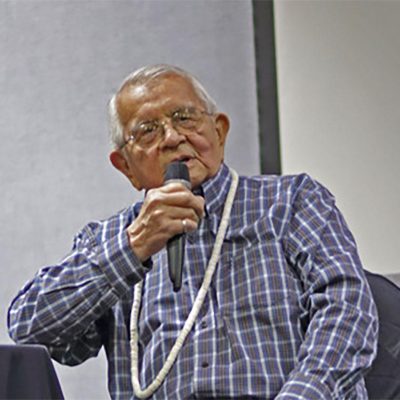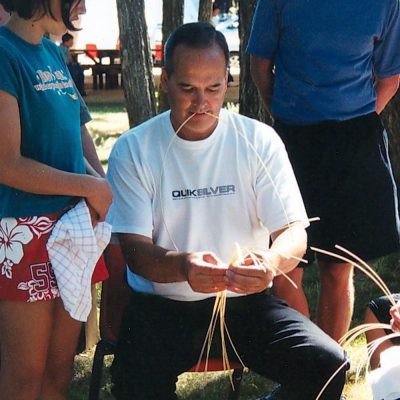
Director of the Indigenous Leadership Program
Congressional hearing on the Siletz Restoration Bill in 1976. Pictured from Left to Right: Delores (Lane) Pigsley, Joe Lane Sr., Robert Rilatos Sr., Arthur S. Bensell, Kathryn (Jones) Harrison, Robert “Bob” Tom, Pauline (Bell) Ricks, Alta (Tom) Courville, and Sister Francella Griggs.
In addition to the briefing recording below, you will find a range of supplemental resources, many suggested by the speakers, to deepen your understanding of the Siletz people and Termination.
Wednesday, January 19, 2022
The federal policy known as Termination was one of the most destructive policies ever initiated by the United States Congress. Passed in 1953 and signed by President Harry Truman, Termination was intended to end tribal rights as sovereign nations and completely dispossess tribes of their lands. Ed Ben (Siletz) will offer his first-hand account of the reactions and actions of the Confederated Tribes of Siletz Indians as Termination was forced upon them. Our second speaker, Bud Lane (Siletz), will discuss the impacts of Termination and the tribes’ efforts to rebuild itself over 44 years to become a vibrant, culturally-focused sovereign nation once again.
“
I loved the open format of an interview; it allowed for more information to be shared than a prepared presentation. Hearing about this from the people experiencing it was impactful and will stick with me more than a presentation.
— Termination Briefing attendee
Download a transcript of commentary from our panelists.
video
Recounts the history of the Siletz tribe from the tribe’s point of view. (12:07)
Video
Bud Lane teaching students the Siletz Dee-ni dialect of the Athabaskan language, as well as traditional basket weaving and regalia making. Here, Bud speaks about the history of the Siletz people. (4:59)
Video
Delores Ann “Dee” Pigsley, Siletz Tribal Chairwoman, was a recipient of an Ecotrust Indigenous Leadership Award in 2011. Pigsley speaks of some of the Siletz Tribe’s greatest accomplishments. (9:10)
Reading
Charles Wilkinson
This book provides an in-depth look at the Confederated Tribes of the Siletz Indians perseverance, survival and revitalization efforts.
Please learn more about and consider financially supporting these Native-led nonprofits:
Siletz-led nonprofit charged with the planning of a new cultural center in the Siletz community

A Navy veteran who served in World War II, Ed Ben was actively involved in the Tribes’ restoration efforts after the Termination Act passed and was elected to the first tribal council post-Restoration. Now an elder at age 93, and following in the footsteps of his father, Archie, Mr. Ben continues to pass on his historical, cultural, and language knowledge about the Tribes to younger generations.

Alfred “Bud” Lane III is the current vice-chairman of the Confederated Tribes of Siletz Indians Tribal Council, a position he has held off and on since 1987. He is a knowledge holder and teacher of the Athabaskan language and culture bearer of Siletz traditions and basketry. Siletz children and adults are learning the language, songs, and dances of their ancestors through Bud. He is a 2007 Indigenous Leadership Award Honoree.

Blog
Recordings and resources from the first of four virtual briefings about Indigenous leadership with Bobbie Conner and Ron Allen presenting.

Blog
Recordings and resources from the third of four virtual briefings on Indigenous Leadership with Nicole Borromeo and Joe Nelson presenting.

Blog
Recordings and resources for the final of four virtual briefings on Indigenous Leadership with Dave Tovey and Robert Miller presenting.